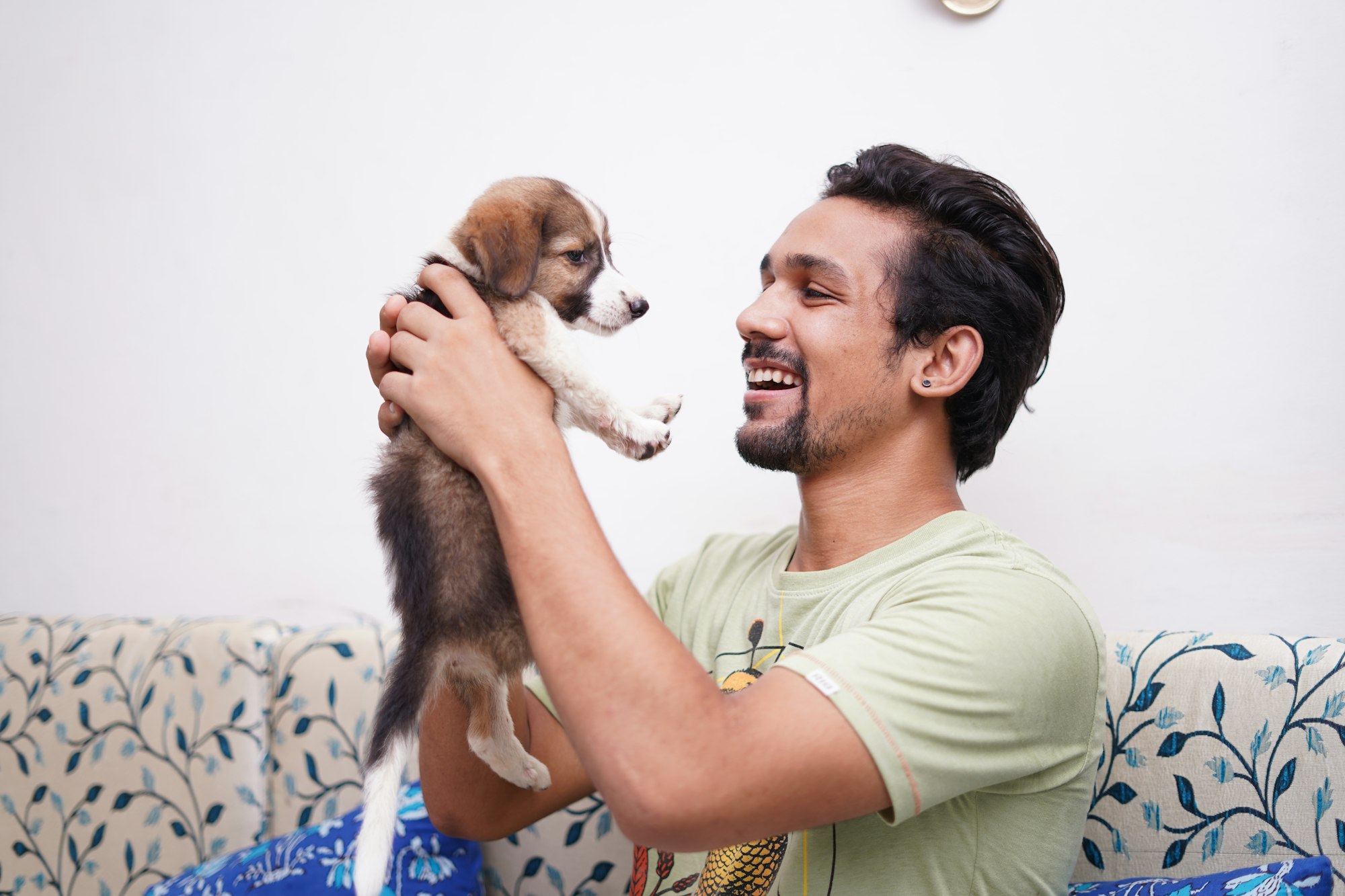Getting a puppy is an exciting venture, but it comes with the responsibility of choosing the right furry companion. Your new four-legged friend should seamlessly integrate into your life, bringing joy and companionship. Here's a step-by-step guide to ensure you pick the perfect puppy for your lifestyle.
Bringing a puppy into your life is a thrilling experience, but with countless breeds and individual personalities to choose from, the decision can be overwhelming. However, fear not! With a thoughtful approach, you can find a puppy that fits your lifestyle like a glove.

Understanding Your Lifestyle
Alright, let's kick off this exciting journey of finding your perfect furry companion by taking a good look at your lifestyle. After all, your lifestyle is the key to unlocking the ideal puppy match.
First things first, grab a cup of coffee, sit back, and think about your daily routine. Are you an early bird hitting the jogging trail at sunrise, or do you prefer Netflix marathons until midnight? Understanding your lifestyle is like setting the stage for the star of the show – your future pup.
Consider your activity level. If you're the adventurous type, you might want a sidekick ready for hikes and outdoor escapades. On the flip side, if your idea of a perfect day involves more couch time than cardio, a laid-back canine companion might be your best bet.
Now, think about your living situation. Are you in a spacious house with a backyard, or is your kingdom a cozy city apartment? Size matters, not just for you but for your future furry friend too.
Researching Breeds
Once you've got a grip on your lifestyle, it's time to dive into the fascinating world of dog breeds. Trust me, it's like exploring a candy store for dog lovers. From the pint-sized Chihuahua to the majestic Great Dane, each breed comes with its own unique set of characteristics.
Are you an active soul seeking a running partner? Breeds like Labrador Retrievers or Border Collies might be your spirit animals. If you're looking for a more laid-back vibe, consider breeds like Bulldogs or Basset Hounds. The key here is finding a pup whose energy levels sync with yours.
Take a deep dive into the traits of different breeds. Some are known for their intelligence and trainability, while others are renowned for being excellent family dogs. It's like building your dream team but in the form of a furry companion.
Size Matters
Now, let's talk about one of the crucial aspects of choosing your perfect pup – size. Picture this: a giant Saint Bernard trying to squeeze into your apartment elevator. Cute, right? But practical? Probably not.
The size of your living space and your pup's size go hand in paw. If you're in a spacious suburban home, a larger breed might fit right in. However, if you're navigating tight city living, a smaller or medium-sized breed could be a better match.
Consider your ability to provide enough exercise and playtime. Larger breeds often need more space to roam, while smaller ones may be content with indoor play and short walks. Size matters, not just for comfort but for the overall happiness of your soon-to-be best friend.
Temperament and Personality
Now that you've navigated through your lifestyle and the world of dog breeds, let's dive into a crucial aspect of your potential furry friend – their temperament and personality. It's like finding the peanut butter to your jelly; you want a perfect match.
Consider your own personality. Are you an outgoing adventurer or more of a Netflix and chill enthusiast? Your pup's temperament should complement yours. If you're active and love the outdoors, a playful and energetic dog might be your ideal sidekick. On the flip side, if you prefer a quiet night in, a more laid-back and relaxed pup could be your perfect match.
Think about what you want from your canine companion. Do you envision a furry friend who's always up for a game of fetch or one who's content to snuggle on the couch? Different breeds have distinct personalities, so finding one that aligns with your expectations is key to a harmonious relationship.
Allergies and Shedding
Alright, let's tackle the often overlooked but oh-so-important topic – allergies and shedding. Nobody wants a red, itchy nose or a home that looks like it's been through a furstorm, right?
If allergies are a concern, fear not; there are breeds considered hypoallergenic. These breeds typically shed less dander, the microscopic particles that trigger allergies. Poodles, Bichon Frises, and Schnauzers are among the hypoallergenic heroes.
Now, shedding is a different ball game. Some dogs shed like it's their full-time job, while others keep their fur to themselves. If you're not keen on finding dog hair tumbleweeds drifting through your living room, consider breeds with minimal shedding. However, keep in mind that all happy dogs shed to some extent, so a regular grooming routine is still on the agenda.

Health Considerations
Health is wealth, not just for you but for your future furry family member too. When picking a puppy, it's crucial to be aware of potential health considerations that come with different breeds.
Start by researching common health issues associated with your chosen breed. Some breeds are prone to specific conditions, so being informed can help you take proactive steps to keep your pup healthy. Regular veterinary check-ups are a must, ensuring early detection and intervention if needed.
Ask the breeder about the health history of the puppy's parents. A healthy lineage often translates to a healthier pup. Responsible breeders are transparent about the health of their breeding dogs and the measures taken to ensure the well-being of their puppies.
Training Needs
Now, let's talk about one of the critical chapters in your puppy parenting adventure – training needs. Picture this as a roadmap for transforming your furry ball of energy into a well-mannered and delightful companion.
First things first, training is not just for your pup; it's a team effort. Consistency is the name of the game. If you decide today that jumping on the couch is a no-go, stick to it tomorrow and the day after. Dogs thrive on routine and clear boundaries, so make sure everyone in the household is on the same page.
Start with basic commands like sit, stay, and come. These are the ABCs of doggy manners. Positive reinforcement is your secret weapon – treats, praise, and belly rubs go a long way in the world of puppy training.
Patience is your best friend. Just like humans, dogs don't become scholars overnight. It takes time, repetition, and a sprinkle of love. And remember, training is a lifelong journey. Even after your pup has mastered the basics, keep introducing new challenges and reinforcing good behavior.
Grooming Requirements
Alright, let's switch gears and talk about grooming – the spa day for your furry friend. Grooming requirements vary wildly depending on the breed, so buckle up for a crash course in doggy beauty school.
Some breeds are high-maintenance, demanding regular brushing, trimming, and even the occasional spa visit. Think of Poodles with their fancy hairdos – they didn't wake up like that! On the flip side, some breeds are more low-key, requiring minimal grooming.
Regular grooming isn't just about aesthetics; it's about your pup's health too. Brushing helps prevent matting and reduces shedding, and keeping those nails trimmed avoids uncomfortable paw problems.
Invest in the right tools – brushes, nail clippers, and maybe even a stylish bandana for that extra flair. If you're not up for the DIY grooming adventure, consider professional grooming services.
Costs Involved
Let's tackle the elephant in the room – the financial side of bringing a furry bundle of joy into your life. While the love your pup gives is priceless, let's break down the dollars and cents involved.
First off, there's the initial investment. The puppy purchase price, vaccinations, and all the necessary gear – bowls, leash, GPS dog collar, and a comfy bed. It's like setting up a nursery for a human baby, but with more squeaky toys.
Then, there are ongoing costs. Dog food, treats, and puzzle toys are the fun part. But don't forget the less glamorous but equally important stuff – veterinary care, grooming, and potential training classes. It's a commitment of both time and money.
Consider pet insurance as a safety net for unexpected veterinary expenses. While it adds to your monthly budget, it can save you a financial headache down the line.
In a nutshell, owning a pup is an investment – in love, time, and yes, money. But the joy, companionship, and endless tail wags? Totally worth it.
Finding a Reputable Breeder
Selecting a responsible breeder is crucial for the health and well-being of your puppy. Watch out for warning signs of a bad breeder, such as poor living conditions or a lack of transparency.
Consider Adoption
Alright, let's talk about an option that not only warms your heart but also gives a furry friend a second chance at a happy life – adoption. It's like being a superhero, rescuing a pup in need and adding a heartwarming chapter to your life story.
Shelters are full of potential soulmates, each with a unique story to tell. Whether you're looking for a specific breed or are open to a delightful mix of characteristics, adoption opens the door to a world of possibilities.
Consider the immense satisfaction that comes with offering a loving home to a pup who might have had a rough start. Adoption is not just a choice; it's a statement – a pledge to make a difference in the life of a four-legged friend.
And here's the thing, adopted dogs often have a profound sense of gratitude. It's like they know you've given them a second chance, and that gratitude translates into an unbreakable bond.
Preparing Your Home
So, you've decided to embark on this journey of puppy parenthood, be it through adoption or bringing home a fluffy bundle of joy. Now, let's get your home ready for the newest family member.
First, think about safety. Puppies are curious explorers, and your home is their playground. Remove potential hazards like electrical cords and small objects that could be swallowed. It's like baby-proofing, but with a wagging tail involved.
Invest in the essentials – a cozy bed, food and water bowls, and plenty of chew toys. Dogs, especially puppies, have an innate desire to chew, so better to provide them with the right outlets.
Create a designated space for your pup. It's their safe haven, a spot where they can retreat when the world gets a bit overwhelming. Equip it with a comfy bed, some interactive dog toys, and perhaps a soft blanket for extra coziness.
The First Meeting
Now, let's fast forward to one of the most exhilarating moments – the first meeting with your potential furry companion. It's like a blind date, but with more fur and fewer awkward silences.
Whether you're adopting from a shelter or meeting a breeder, take your time. Observe the puppy's behavior – is it curious, playful, or a bit shy? Ask questions about their health, history, and any specific needs.
It's not just about you choosing a puppy; it's about the puppy choosing you too. Pay attention to the connection you feel. Is there a spark? That unspoken bond that makes you go, "Yep, this is the one."
Making the Final Decision
Drumroll, please! You've navigated through lifestyle considerations, researched breeds, understood grooming needs, and now, you've met a potential furry family member. The moment has arrived to make that final decision.
Summarize all the information you've gathered – lifestyle fit, grooming commitments, training needs, and that indescribable feeling during the first meeting. Trust your instincts; they're powerful guides.
This decision isn't just about finding a pet; it's about welcoming a lifelong companion. Choose with confidence, knowing you've put thought and heart into the process. And when you make that decision, get ready for a life enriched by wagging tails, wet noses, and unconditional love.
Choosing the Perfect Puppy: Key Considerations
| Consideration | Description | Examples |
|---|---|---|
| Size | Different breeds vary in size, from tiny teacup breeds to large gentle giants. It's essential to consider your living situation, available space, and physical ability to handle the dog. | Small: Chihuahua Medium: Beagle Large: Golden Retriever |
| Temperament | Dog temperaments can range from independent to affectionate, or energetic to laid-back. Assess your own personality, energy levels, and what you desire in a dog's behavior before choosing. | Playful: Labrador Guardian: Rottweiler Independent: Shiba Inu |
| Exercise Needs | All dogs need some form of exercise, but the intensity and duration vary by breed. Consider your own lifestyle and the amount of time you can dedicate to exercising your dog. | High: Border Collie Moderate: Pug Low: Basset Hound |
| Grooming Needs | While some dogs have minimal grooming needs, others require regular brushing and professional grooming. Think about the time and financial commitment you're willing to make. | High: Poodle Moderate: Cocker Spaniel Low: Dalmatian |
| Health Concerns | Many breeds have hereditary health issues. It's crucial to research and be prepared for potential health concerns, as this can affect the dog's quality of life and your finances. | Brachycephalic: Bulldogs Hip dysplasia: German Shepherds Eye issues: Cocker Spaniels |
| Training Needs | Some dogs are easier to train due to their eagerness to please, while others can be more stubborn. If you're a first-time dog owner, you might prefer a breed that's more trainable. | High: Siberian Husky Moderate: Boxer Easy: Cavalier King Charles Spaniel |
| Lifespan | Knowing a breed's average lifespan can help you prepare for the long-term commitment. Some dogs live longer than others, and it's essential to be ready for the responsibility. | Short: Great Dane (7-10 years) Medium: Beagle (12-15 years) Long: Chihuahua (14-17 years) |
Conclusion
Choosing a puppy is a significant decision, but armed with knowledge and a thoughtful approach, you can find the perfect furry friend to share your life with. Consider your lifestyle, research breeds, and be prepared for the responsibilities that come with puppy parenthood. The journey of selecting a puppy is as rewarding as the companionship that follows.

FAQs
- Q: How do I know if a breeder is reputable?
- A: Look for signs such as transparent communication, clean living conditions, and a commitment to the health and well-being of their puppies.
- Q: Are there specific breeds better suited for apartment living?
- A: Yes, smaller breeds or those with lower energy levels tend to adapt well to apartment living.
- Q: What should I ask a breeder or shelter during the first meeting?
- A: Inquire about the puppy's health history, behavior, and any specific needs or requirements.
- Q: How much time does training a puppy typically require?
- A: Training duration varies by breed and individual characteristics. Consistency and patience are key.
- Q: Is adopting a puppy from a shelter a good idea?
- A: Absolutely! Shelters offer a chance to give a loving home to dogs in need, and many wonderful companions are waiting for adoption.

